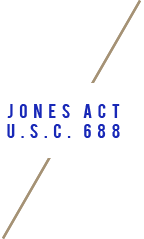Maritime lawyers, Gordon Elias & Seely, LLP, newsroom and press includes published media from CNN, PBS, AP, National Geographic, MSNBC, videos and articles about the BP Transocean Deepwater Horizon disaster including the Chris Choy survival story.
The Jones Act
The Jones Act is a federal statute that the legislature passed in the 1930s, which gives seamen injured during their employment the right to sue for personal injury. The law entitles almost every land-based worker to worker’s compensation benefits under federal and state law. In the maritime industry, these rules don’t apply. Since the law doesn’t permit seamen to file worker’s compensation claims, the Jones Act is an important piece of legislation that gives maritime workers financial recourse for their injuries.
To collect compensation under the Jones Act, injured maritime workers must prove their employer was negligent. In accordance with the terms of the Jones Act:
- A maritime employer must provide a reasonably safe place to work.
- An employer must use reasonable care to keep and maintain the vessel on which a seaman is working.
If maritime employers fail in their duty to provide and maintain a safe workplace, they may be liable for negligence to both the captain and coworkers. The courts consider the Jones Act employee-centric, as it puts the burden on the employer to ensure a safe workplace. The following are examples of unsafe conditions or negligence under the Jones Act:
- Malfunctioning equipment
- Oil or grease on deck
- An improperly maintained vessel or equipment
- Failure to provide proper safety equipment
- Improper or incomplete training or the employee or coworkers
- Unsafe work processes
- Coworker assault
- Any negligence of a seaman’s coworkers or captain
The Longshore and Harbor Worker’s Compensation Act
The second avenue of recourse for injured maritime workers is called the Longshore and Harbor Worker’s Compensation Act – LHWCA. This is a federal statute that provides injury benefits for certain maritime employees as well as civilian employees on military bases. The LHWCA protects harbor workers, longshoremen, and people who work on docks, shipping terminals, and shipyards.
The LHWCA offers monetary benefits to injured workers who are:
- Temporarily but totally disabled
- Temporarily but partially disabled
- Permanently but partially disabled
- Permanently and completely disabled
Under the LHWCA, an injured maritime worker may also receive compensation for all their necessary medical treatments as well as reimbursement for mileage and travel associated with medical treatment and rehabilitation.




















